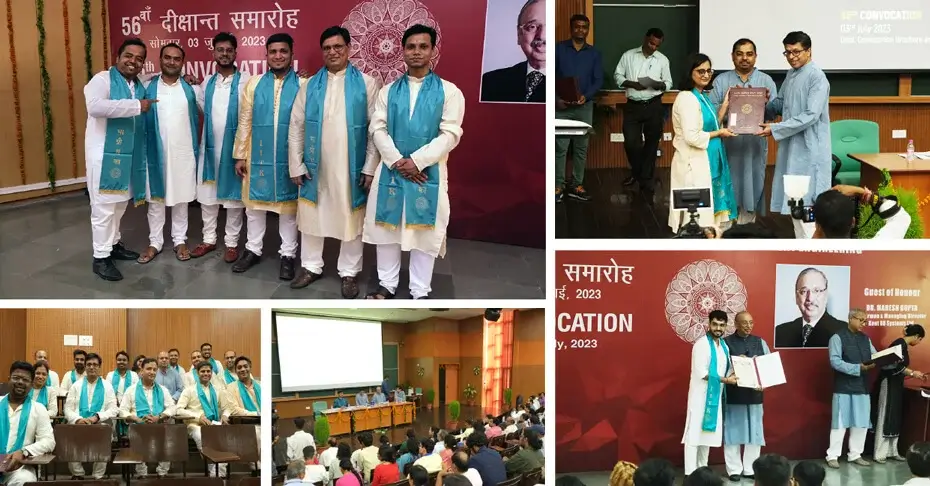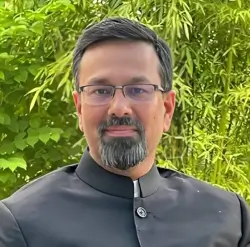The Compulsory Modules include
Health Systems and Public Health
- Public Health and its determinants: an overview: Public Health: what it is and how it works, Public health history, philosophy and values, Determinants of health: socio, economic, political and cultural factors; environmental factors; biological and genetic factors; behavioral and psychological factors; globalization, Critical importance of evidence in advancing public health knowledge
- Burdens and prevention of diseases and applications of epidemiology: Causes and trends of morbidity and mortality, The science of primary, secondary, and tertiary prevention in population health, Basic concept, and applications of epidemiology
- Health Policies and Systems, and its performance Health Systems, Health Policies, WHO’s Health Systems Building Blocks Framework, Complex and Mixed Health Systems, Discrete components of performance vs. composite scores/rankings, Systems theory: the environment/ context of healthcare system functionshistory, culture, and politics on shaping and informing healthcare policies and systems
- Understanding the Concept and Practices of Universal Health Coverage UHC Concepts, Strategies and pathways to UHC, Country experiences and lessons for India: Thailand, China, Brazil.
- Health Systems and Policies: Indian Scenario: Burden of Communicable and non-communicable diseases, Maternal and child health situation and other key health challenges, Health systems situation in India, Central and state missions, Programs and policies for health, Structure of public and private health care system, Water, Sanitation and Nutrition initiatives for health, Union and state budgets for health, Financing for health: PM-JAY and state level schemes, State of health systems data and evidence, Regulatory arrangement for health systems
Microeconomics and Policy Applications
- Fundamentals of Market Economy: Need for choice in decision making, Basic principles of economics, Laws of demand and supply, Price determination, Consumer and producer surplus, Price controls, Elasticity
- Consumer Choice: Utility theory, Indifference curves and budget constraint, Optimizing conditions
- Theory of Production and Cost: Economic versus accounting measures of cost and profit; Law of production, Revenue, Cost, and Profit functions, Isoquant and Isocost, Optimizing conditions; Breakeven analysis and the shutdown rule
- Types of Market: Perfect competition, Monopoly, Oligopoly, Monopolistic competition, Price and output determination, Strategic decision making in oligopoly markets, Advanced pricing techniques
- Welfare Analysis: Welfare analysis: market regulation and health sector, Welfare loss in imperfect competitive markets
- Externalities and Market Regulation: Positive and negative externalities and population health, Externality taxes, Regulation of externalities, Public goods and the risk of free rider problem, Limitations of market regulation
Macroeconomics and Economic Policy
- Macroeconomic Concepts: An overview of macroeconomic environment and health; National income accounting and health accounting; Inflation measurement methods: CPI, GDP deflator and healthcare inflation; Money: functions and measures
- Macroeconomic Equilibrium: Business cycles, Macroeconomic equilibrium though various schools of thought, Inflation-unemployment trade-off
- Policy Effects: Fiscal and monetary policy effectiveness, Trickledown
effects, and development goals
- Economic Policy: Tools of monetary and fiscal policy, Central banking, Credit creation and money multiplier, Strategies and tactics of monetary policy: interest rate versus monetary aggregate targeting; Inflation targeting and international experiences; Macroeconomics policies and health sector
- Foreign Sector: Balance of Payments Account and Exchange Rate Systems; Bretton woods system, Foreign aid, IMF and international liquidity
Health Economics and Policy
- Overview and Demand for Health: Uniqueness of health sector and market, Role of economics in healthcare, Demand for health; determinants of healthcare demand, Consumer choice and demand
- Supply of Healthcare: Healthcare production and technology, Healthcare providers and their behavior, Market structure in healthcare, Healthcare cost measurement, Cost drivers in healthcare,
- Healthcare Markets and Managed Care: Market failures in healthcare, asymmetric information ad agency, Government intervention in healthcare, Antitrust policy and healthcare Regulated competition, Managed care organizations, Provider payment mechanisms, Managed care theories and relevance for policy
- Inequality, Equity, Efficiency, and Need: Equity Analysis: Measuring, decomposing, and explaining inequalities in health, Equity in distribution and delivery of health; Efficiency analysis: Data Envelope Analysis-theory and applications
- Theory and Principles of Economic Evaluation: Theoretical foundations of economic evaluation, Cost-Benefit Analysis, Cost-Effectiveness Analysis, Cost-Utility
Analysis
- Economic Evaluation: Monetary Valuation of Health: Non-monetary Valuation of Health: QALY, DALY & HLYE, Costing, Discounting & Evaluation under Uncertainty
Financial and Economic Environment
- Finance environment: Direct and Indirect finance, financial institutions,
instruments and markets
- Debt and equity market: Bond markets; interest rates and its determination, basic theories of interest rate; credit ratings; sovereign ratings and public health spending; equity pricing
- Financial institutions Banking, insurance, mutual funds and pension funds, Regulation of Financial markets
- Future and Option contracts Futures contracts, futures and leveraged speculation, future
price in relation to current spot price, nature of option
trading, price discovery, hedging. Index futures, future
trading platforms, equity index basis, trading strategies
- Demand for insurance and pricing strategy Nature of general insurance-classification-effects of different marketing strategies. Uncertainty, risk aversion, and insurance, comparing insurance contracts. Insurance cost and fair premium, life insurance and annuities. Basic methods for rating, reserving, financial planning, assets, and liability position
- Healthcare financial management: Finance management in hospital, insurance companies,
pharmaceuticals
- Financial statements analysis Objective and Technique of financial statement analysis,
meaning and usefulness of financial ratios, analysis of
financial ratios, profitability ratios, solvency ratios, liquidity
ratios
Applied Health Econometrics using R and Python
- Introduction to R and Python: Introduction to Python
- Basic statistical methods: Types of data, descriptive statistics, graphical analysis, sampling and sampling distribution, interval estimation, hypothesis testing and statistical inference
- Simple and Multiple Linear Regression: Assumptions, diagnostics, specifications, and forecasts
- Limited Dependent Variable Regression: LPM, Logit, Probit, Tobit with the ordered, multinomial, and nested variants, count data models and their applications in health data analysis. Nonparametric methods
- Panel Data Modelling: Basics of panel data modelling – fixed and random effects and GMM
- Multilevel Modelling: Mixed effects models, Random intercept, and random
coefficient models in applied health econometrics
Evaluation of Health Programs and Policy
- Introduction: Health programs and policies, Process and outcome evaluation, Program logic models, and evaluation framework
- Evaluating program and policy impacts: Theory of change, Endogeneity concerns and identification strategies, Randomised field experiments, Internal and external validity
- Quasi-experimentalapproaches: Application of IVs and LATE, RDD; DiD, Matching methods, Recent developments
- Impact of population level policy interventions: Interrupted time-series, Event study analysis, applications in alcohol and tobacco control policies
- Evidence-based policy formulation: Contextualizing the research inferences, ATT and ITT in various health policy goals contexts
Health Analytics and Machine Learnings
- Introduction & Electronic Health Records: Introduction to data analytics and informatics in healthcare, Healthcare performance metrics, Electronic Health Records (EHR) systems, Networking, Interoperable HIT, Health Information Exchange
- Data mining: Mining of Sensor Data in Healthcare, Information Retrieval for Healthcare, Clinical Decision Support Systems, Natural Language Processing, Data Mining for Clinical Text
- Health Data Management: Data collection, storage, and retrieval in healthcare settings. Data standards and interoperability. Data privacy and security in healthcare
- Machine Learning in Healthcare Data Analysis (using Python): Machine learning methods, Statistical analysis of health data, Predictive modelling, and machine learning in healthcare
- ML approaches: Linear Regression, Clustering, Classification methods and Resampling, Decision trees, Deep learning, Support vector machine
- Applications of ML: Survival Analysis and Censored Data, Unsupervised Learning
Large Data Analysis
- Handling Large Data: Familiarization and handholding with unit level publicly available data sets
- Data Management: Data management, data extraction, coding and decoding variables, value labelling, graphical analysis, statistical analysis
- Repeated Cross-sectional Data Analysis: Building panel data from repeated cross-sectional
data from NSSO and NFHS; Basic statistical analysis
- Cohort Data Analysis: Analyzing cohort data sets (IHDS, DFID YL,
UNICEF, and WHO SAGE data)
- Data Replication: Replication of a published research paper
Public Finance and Policy
- Tools of public finance: Why public finance, size and growth of governments, Theoretical tools and social welfare maximization, Empirical tools
- Budget Analysis and Deficit Financing: Budget process, Fiscal deficit, and public debt, measuring the budgetary position, Importance of government fiscal position
- Taxation in Theory and Practice: Type of taxes; Measuring the fairness in taxation, Principles and Theories of taxation; Tax incidence and equity implications; Optimal taxation, Taxes on labor supply, savings, risk taking, wealth and business income
- Externalities and Public Goods Externality theory, private and public sector solutions, Public Goods, Public Choice: Mechanisms and Dilemmas, Cost-benefit analysis
- Social insurance and distribution: Social insurance, Social security, Unemployment insurance, Health insurance, Income inequality and government transfer program
- Indian Public Finance: Fiscal Federalism, Finance commission: Revenue Sharing Formula Design, Indian budget and health
Health Insurance and Financing
- Introduction: Healthcare financing models, OECD and WHO frameworks, Developing a health financing strategy, Equity in Finance
- Organization of Health Insurance Markets: Insurance principles, Types of health insurance, Limits of insurance, Benefits package design
- Demand for Health Insurance: Theories of insurance demand, Market failure in
insurance market: adverse selection and cherry
picking, and moral hazard
- Supply of Health Insurance: Supply side and control of healthcare utilization, Managed care and claim payment
- Social Health Insurance: SHI models in OECD and LMICs settings, Managed competition, Towards competitive health insurance markets
- Provider Payment Mechanism: Prospective vs. retrospective, Aggregate vs. disaggregated units, Common provider payment mechanisms, Relevance of managed care
- Indian Health Insurance Market: Structure of Indian health insurance market: social, voluntary and community health insurance models, TPAs, Regulations
Research Project
- Research Project: Research theme from health sector

 Sukumar Vellakkal
Sukumar Vellakkal Thirumulanathan D
Thirumulanathan D Nisheeth Srivastava
Nisheeth Srivastava Sanjeev Kumar
Sanjeev Kumar Anna Thottappilly
Anna Thottappilly Mohammad Arshad Rahman
Mohammad Arshad Rahman Sohini Sahu
Sohini Sahu VR Raman
VR Raman Kabir Sheikh
Kabir Sheikh Live Interactive Sessions & Guest Lectures
Live Interactive Sessions & Guest Lectures Projects
Projects  Online Examination
Online Examination Campus Visit
Campus Visit
 Education loan avail from
Education loan avail from 

